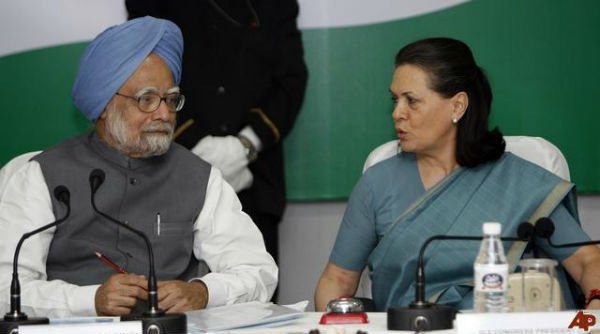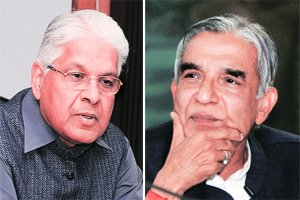May 12, 2013
Vaishakh Shuklapaksha 2, Kaliyug Varsha 5115
By Shashi Shekhar
 |
Union Railway Minister Pawan Kumar Bansal and Law Minister Ashwani Kumar finally resigned on Friday evening after a tumultuous week that saw the UPA’s brazenness plumb new depths. The most fascinating thing about the UPA’s brazenness in the face of naked corruption and duplicity is the manner in which the Prime Minister Manmohan Singh and the Congress President Sonia Gandhi have been allowed to distance themselves from all the taint.
If one were to put real physical distance between the Prime Minister and his office for every time his spin doctors have sought to distance him from a controversy, Manmohan Singh would probably find himself in the whereabouts of Point Pygmalion (the Southern most tip of India).
Eminent columnist and policy wonk Pratap Bhanu Mehta had some scathing words for both Manmohan Singh and Sonia Gandhi in a recent column.
To quote Mehta :
“The responsibility for a culture of corruption, evasion, lying and sheer contempt for institutions lies directly at the door of Sonia Gandhi and Manmohan Singh. Their air of injured innocence has become nauseating”
It must be asked though, how is it that 9 years and 2 terms later the nation’s thinking class is only now belatedly attempting to fix responsibility for the UPA’s brazenness at the doorstep of the Prime Minister and the Congress President.
It must also be asked how is it that for 9 years and 2 terms both Manmohan and Sonia managed to deflect attention away from this brazenness with what Mehta describes to be an “air of injured innocence”.
Let us face it, the UPA’s brazenness is neither the result of some newfound electoral confidence nor is it of recent making. When BJP leaders like BS Yeddyurappa and Nitin Gadkari had to exit for indiscretions of far less consequence when is compelled to ask what gives the UPA’s brazen leadership a free pass?
The stark contrast in the manner in which Manmohan Singh and Sonia Gandhi were given a free pass on public accountability while Yeddyurappa and Gadkari were sacrificed by the BJP tells a story on how public opinion has been subtly manipulated over the years. Nothing exemplifies this better than the shallow manner in which the Congress in Andhra Pradesh and the unrelenting manner in which the BJP in Karnataka have been covered by Delhi’s media over alleged cases of corruption by either party in either State.
Consider these facts :
A simple keyword search on Google News Archives on “Karnataka, Corruption” throws up around 800 news stories between 2008 and 2013. During the same period, “Andhra, Corruption” throws up less than half the number of news stories on Google News Archives with a good chunk of those stories being on the Bellary Reddy Brothers’ trial in Hyderabad. While nearly 700 of those 800 news stories on Karnataka and corruption had a reference to the BJP, only 300 news stories on corruption in Andhra Pradesh had a reference to the Congress Party.
 |
These factoids however do not even begin to tell the story of how Sonia Gandhi and Manmohan Singh were shielded completely from the Congress’ corruption in Andhra Pradesh.
A mere 4 news stories of those 300 news stories on Congress Corruption in Andhra Pradesh had any reference to Ms. Sonia Gandhi. The count drops to one news story when one goes looking for references to Dr. Manmohan Singh.
While these absolute counts don’t necessarily reflect the actual number of news stories during that time period, in relative terms the infinitesimally small number of stories with negative references to the UPA leadership on Corruption says a lot on the manner in which Manmohan Singh and Sonia Gandhi have been shielded by the media from negativity.
If we were to turn the lens further to focus on how specific media outlets covered alleged corruption by either party in power in the above states during the same time period the following picture emerges.
A keyword search on Corruption in Karnataka with references to the BJP throws up around 53 news stories on Google News Archives between 2008 and 2013. In relative terms the same search on Congress and Andhra throws up less than 10 news stories on NDTV. Ignoring the absolute counts, the relative ratio is stunning on how lightly NDTV has covered negative stories on the Congress in Andhra Pradesh. Applying the same search to the Times Group throws up about 10 news stories on Congress Corruption in Andhra. In stark contrast a staggering 78 news stories pop-up on the BJP in Karnataka.
If these findings resulting from an amateurish exercise in media research can reveal such deep political bias one wonders what a thorough professional analysis could end up exposing?
Little wonder that the overwhelming pressure the media brought to bear on the BJP over relatively minor ethical transgressions by Yeddyurappa and over a whisper campaign against Nitin Gadkari had tripped the BJP into politically sacrificing both of them.
Contrast this with how Congress Chief Ministers from Ashok Gehlot to B.S. Hooda have managed to continue in office despite far greater ethical transgressions on account of Ms. Gandhi’s extended family while someone like Virbhadra Singh managed to enter Elected Office with corruption charges against him being dismissed by a local court just the day before he was sworn into office.
Mehta in his Column earlier in the week wrote :
“The republic is now at a delicate crossroads. The government may brazen it out. But in doing so, it is creating a crisis of institutions not seen since the Emergency days”
This crisis and this brazenness of ‘emergency magnitude’ is not the result of some abstract failure of Institutions. It is the direct result of the conspiracy of silence of the media and the thinking class in holding the Congress leadership to account over the past nine years on issues ranging from corruption to abuse of office to inexcusable lapses in battling terrorism.
 |
An all too familiar script has been repeated over the past nine years on each and every one of these issues that usually starts with a false equivalence between the BJP and the Congress before going on to deflect the focus from the Congress by accusing the BJP of ‘politicising’ issues.
We indeed live in a ‘Phantom Democracy’ as Mehta describes it for the media and the thinking class have helped Manmohan Singh and Sonia Gandhi put so much distance between themselves and their political brazenness that they can no longer see their own shadows.
The institutional crisis resulting from the UPA’s brazenness cannot be effectively countered until the media and the thinking class get over their BJP obsessive compulsive disorder to bring a sense of proportion to their critique of the BJP. The BJP too needs to get out of this self-flagellating frame of mind it finds itself trapped in since the UPA took office.
In closing it is pertinent to point to a side story from the Karnataka election earlier this week.
A Bangalore based Political Action Committee (B-PAC) that sought to fund clean candidates for the Karnataka Assembly election also went to great lengths to support candidates outside of the mainstream political parties. The Karnataka results however brought a reality check to this effort with 3 out of the 5 winning candidates endorsed by the B-PAC being from the BJP while the two others were from the Congress.
The quest for a so called ‘alternative’ political party is a mirage that the thinking class often chases to end up with little. For all of its faults the BJP remains the thinking class’ best bet for a clean and credible alternative to the Congress as the B-PAC’s mini-experiment in Bangalore has revealed.
The UPA’s brazenness calls for the media to abide by its Dharma, even if belatedly so, by holding the Congress Leadership to account. The thinking class must also discharge its Dharma by taking a clear and unambiguous political stance against the Congress.
Sitting on the fence is no longer an option for sitting on the fence in the face of what Mehta describes as “governance torture on the country” would only mean a third term for the UPA that would bring with untrammeled ‘Arrogance of Power’ perhaps unseen even during the Emergency.
No comments:
Post a Comment